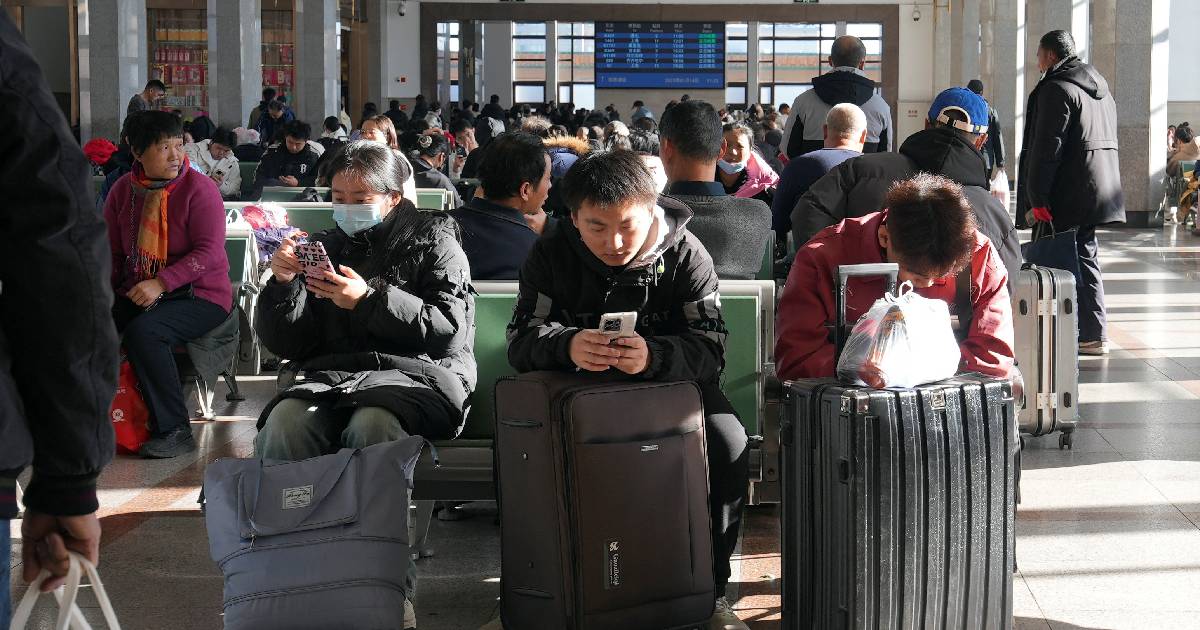Economic woes not a deal breaker as China's Lunar New Year travel rush kicks off


BEIJING — The annual travel rush for China's Lunar New Year celebrations officially began on Tuesday (Jan 14), with many taking a mental break from their worries about the future to reunite with family or take a holiday.
The peak travel season in the world's second-largest economy kicked off with a train departing from Beijing minutes after midnight, taking early bird travellers from the capital to Hefei in eastern Anhui province.
Most people aim to be with family for the traditional reunion dinner on the eve of the New Year, which falls on Jan 29 this year.
The 40-day travel season will continue until Feb 22, during which authorities estimate a record 9 billion domestic trips will be made. The forecast matches 2024's estimate, although only 8.4 billion trips were actually made during last year's festivities.
Railway passenger volume is expected to exceed 510 million passengers, while more than 90 million passengers are expected to fly. However, the number of journeys by private vehicle is expected to reach 7.2 billion trips, or about 80 per cent of the total domestic passenger flow, national television broadcaster CCTV said.

Most of China's 1.4 billion population will be celebrating this year's Lunar New Year, also known as the Spring Festival, at a time when the economy is struggling to sustain a durable recovery hamstrung by weak domestic demand and a prolonged property market crisis.
Some travellers said they would not allow the state of the economy to take the shine off the upcoming celebrations.
"Although the economy has slowed down, I think the country as a whole is taking into consideration (the economic situation) and us, as ordinary people, are living well (day to day)," said Wang Zhixu, a 55-year-old who works in property management services, and was at the station in Beijing.
"Peace within our country brings us the most happiness."
Air passengers who purchased multiple destination tickets for the festive period rose 50 per cent compared to last year, and hotel bookings in some counties have increased, CCTV said.
Beijing, Guangzhou, Harbin, Dali and Fuzhou were popular destinations for holidaymakers making the most of the eight-day public holiday.
But for young people looking for work, the outlook is different.
Shi Zhenyue, 22, en route to Harbin for a holiday with friends before travelling on to Wuxi in eastern Jiangsu province to celebrate the New Year with family, hoped for an improvement in the economy so she could join the workforce.
"If the economy does get better (in the new year), I will have a better chance of finding a job, and I won't have to go back to study for a master's or doctoral degree. And if the economy improves, my father's bonus (from work) won't be halved. Everything else is fine," Shi said.
Youth unemployment hit 18.8 per cent last August, the highest since the authorities changed the way they calculated the figures in Dec 2023. Although joblessness data has shown some improvement in recent months, millions of college graduates have been pushed into accepting low-paying work or even subsisting on their parents' pensions.
Many have also abandoned the stresses of big cities for a simpler life away from the hustle.
For 33-year-old He who lives in northeastern Liaoning province with her fiance, the slower pace of life is a comfort.
"Because we are not in a very big city like everyone else, we may not have too much pressure," said the small business owner who only gave her surname.
"We had also stayed in the big city for a period of time after graduation, and then we chose to go back to our home town where we feel is friendlier, and also happier," she said.
[[nid:713247]]